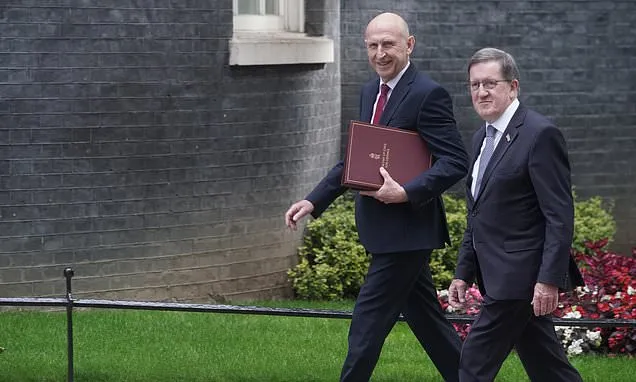Britain and its people are not safe, a former Nato general secretary has warned, as he told Parliament describing the country as underprepared for war is an "understatement".
Lord Robertson of Port Ellen, who co-wrote the Strategic Defence Review (SDR), said the UK is lacking in ammunition, training, people, logistics, and medical capacity.
He told the upper chamber: "Bearing in mind the difficult world that we live in and have to survive in, this is what I firmly believe: we are underinsured, we are underprepared, we are not safe.
"This country and its people are not safe."
"The British people are faced with a world in turmoil, with great power competitions spilling over now into conflict, with constant grey zone attacks on our mainland, and with Russia - often with the co-operation of Iran, China and North Korea - challenging the existing world order.
"We simply in this country are not safe."
The Labour peer wrote the review alongside the former commander of the joint forces command, General Sir Richard Barrons, and defence adviser Dr Fiona Hill.
Artificial intelligence, drones and a £1 billion investment in homeland missile defence all form part of the review's plan to keep the UK safe in the face of threats from Vladimir Putin's Russia and the rise of China.
As peers debated the review on Friday, Lord Robertson said: "When we say in the report that we are unprepared, it is an understatement.
"We don't have the ammunition, the training, the people, the spare parts, the logistics, and we don't have the medical capacity to deal with the mass casualties that we would face if we were involved in high-intensity warfare.
"Over the years, and I suppose I must plead guilty to that as well, we took a substantial peace dividend, because we all believed that the world had changed for the better."
He continued: "Sadly, we were not alone in that. There may have been over-optimism, but at worst, wishful thinking, but the brutal, full-scale invasion of Ukraine by Putin's Russia three years ago was a savage wake-up call for all of us.
"This world we now live in has changed out of all recognition, and we have got to change as well."
Lord Robertson told the upper chamber he is "confident" the review will "intimidate our enemies, inspire our friends, invigorate our defence industry, and make our country safer".
Conservative shadow defence minister Baroness Goldie pressed the Government to be specific about the amount of money and timing needed for defence spending to reach 3% of GDP.
She said: "In this exciting and brave new world for defence, the elephant in the room is money, and none of this excellent aspiration proposed by the review means anything without attaching pound signs to the proposals.
"Ambition must translate into specific financial commitment."
Former military chief Lord Stirrup said the Government's spending would need to be restructured to be "anywhere near 3.5% of GDP for defence by 2035".
"There is no sign of any urgency on any side of the political divide on addressing this crucial matter," the crossbench peer added.
Conservative former defence minister Lord Soames of Fletchling said the British people needed to be told what they should do in the event of a cyber attack that knocked out the internet and phone networks.
Lord Soames, who is the grandson of Second World War prime minister Sir Winston Churchill, called for the public to have food stocks at home.
He said: "I believe that unless the public has some idea of the sense of urgency, the only way really to wake people up is to establish either a minister or ministry of civil defence, charged with training millions of people how to respond to an attack."
Meanwhile, Tory peer Lord Harlech, who is a reservist, said the Government needed to pay more attention to the Territorial Army and other reserve forces.
He said: "For too long, we have treated reserves as an afterthought. A just-in-case solution. Too often called on at short notice, handed out outdated kit, sidelined from training opportunities and then expected to deliver at the same standard as regulars.
"If we are to rely more heavily on the reserves, as the review suggests, then we must be honest about what that actually requires.
"It means giving them the same standard of equipment; no more trickle-down hand-me-downs. It means equal access to courses and training opportunities.
"Too often reserves find themselves bumped off areas by cadets or even airsoft groups. That is not how a serious military trains."
